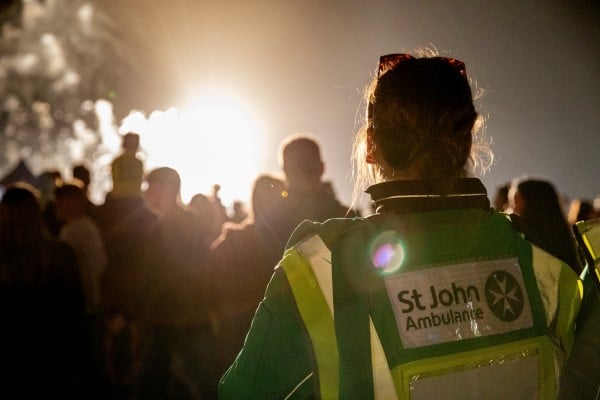Thursday 24 October 2024: As communities prepare to celebrate Halloween, Diwali and Bonfire Night with a bang, St John Ambulance shares some simple, but lifesaving, first aid advice for those adding a bit of sparkle to their celebrations this year.

Bright Lights, Safe Nights
Firework filled festivities are often great fun for adults and children, but they can be prone to accidents and injuries.
St John Ambulance’s Medical Director, Dr Lynn Thomas, said: “If you’re celebrating over the next couple of weeks for Halloween, Diwali and Bonfire Night by lighting candles, sparklers, fireworks or even bonfires - please enjoy yourself, but do so safely.
"Our volunteers will be out and about at events in your community, but it’s always worth brushing up on your fire-related first aid knowledge so you’re prepared just in case something does go wrong. Some simple first aid techniques, like knowing how to cool a burn or remove cinders from the eye, can make all the difference in helping you celebrate safely.”
She added: “I’d encourage everyone to be mindful of their neighbours this year too. As it’s not just our pets that fireworks can sometimes upset – it can affect everyone differently, especially those suffering from mental health conditions. So just make sure to look out for one another.”
Trained St John Ambulance volunteers will be supporting at Diwali and Bonfire Night events across the country, and the charity has shared some important fire-related first aid advice for those looking to enjoy the celebrations:
Firework First Aid
Burns or scalds
If someone’s got a burn or scald:
- Move the person away from the heat
- Place the burn or scald under cool or lukewarm running water for 20 minutes minimum
- If the burn is to a child, larger than their hand, on the face, hands or feet, or is a deep burn, call 999
- Remove jewellery and clothing around the area, unless stuck to the burn
- Cover the burn loosely, lengthways with kitchen film wrap to help prevent infection and keep it clean
- Don’t burst blisters
- Monitor and treat for shock if necessary
- Tell them to seek medical advice. This is essential for all severe burns and also for minor burns in children, or if on the face, or if you are concerned about someone’s condition.
Debris in the eye
If someone’s got something in their eye:
- Tell them not to rub it, so they don’t make it worse or cause more damage
- Tilt the head so affected side is nearest the ground. Pour clean water over their eye to wash out what’s in there and/or to cool the burn
- If this doesn’t work, try to lift the debris out with a damp corner of a clean tissue
- If this doesn’t work either, don’t touch anything that’s stuck in their eye – cover it with a clean dressing or non-fluffy material
- Then take or send them straight to the Emergency Department at hospital.
Smoke inhalation
If someone’s inhaled smoke fumes:
- Move them away from the smoke so they can breathe in some fresh air
- Help them sit down in a comfortable position and loosen any tight clothing around their neck to help them breathe normally
- If they don’t recover quickly, call 999 for an ambulance. Keep them calm whilst they are waiting.


